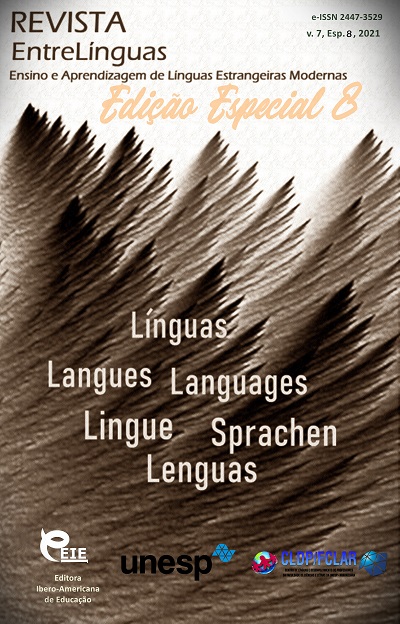Metáfora zoomórfica que caracteriza a un hombre en un texto literario: dificultades de traducción en idiomas con diferentes estructuras (el caso del ruso y el turco)
DOI:
https://doi.org/10.29051/el.v7iesp.8.16359Palabras clave:
Metáfora, Zoomorfismos, Traducción, Semántica, Denotatum, Hombre, Lenguaje, Texto, MentalidadResumen
El artículo ofrece un análisis de las metáforas zoomorfas que caracterizan a una persona en un texto literario. El estudio tiene la intención de revelar cuellos de botella en la traducción a idiomas con diferentes estructuras. El estudio parte de los principios científicos generales de sistematicidad, correspondencia, integridad, complementariedad, consistencia, determinismo y verificación. Los métodos utilizados en el trabajo son el método de unidad de lo histórico y lo lógico en el conocimiento sociocultural, métodos comparativos, contrastivos. A partir de la finalidad y los objetivos se ha empleado el análisis comparativo, la síntesis interdisciplinar y otras técnicas de metodología científica general. Los principales hallazgos: el estudio de metáforas zoomorfas que caracterizan a un hombre en un texto literario muestra estereotipos inconscientes no solo al interpretar la imagen de otro por parte de un hablante nativo de la lengua nacional, sino también los detalles de la imagen del entorno circundante, que emana de la mentalidad y manifestado al elegir ciertas categorías y conceptos al describir el mundo.
Descargas
Citas
Atasözleri ve Deyimler Sözlüğü [online] Available at: https://sozluk.gov.tr/ (Accessed: April 09, 2021)
Güncel Türkçe Sözlük [online] Available at: https://sozluk.gov.tr/ (Accessed: April 09, 2021)
KOLESNIKOVA, G.I. Vagaries of Translation: Types, Factors, Influence over Interculturality. A Collection of the Reports of the International Symposium in the Context – Heydar Aliyev: the Ideology of Multiculturalism and Tolerance – “Heydar Aliyev and the Turkic World”, Dedicated to the 95th Anniversary of the Birth of the Founder of the Independent Azerbaijani State, Heydar Aliyev (April 13-14, 2018. Erzurum, Turkey). 365 p. - P.176-184. ISBN: 978-605-2278-66-6
KOLESNIKOVA, G.I., KONOVALOVA, А.V. Education System in Modern Russian Society: Problems and Solution (or “Who is to Blame?” And “What is to Be Done?”)// Humanization of Education, 2018, Issue 3. 134 p. P.9-15.
The Explanatory Dictionary of the Russian Language /edited by Ozhegov S. I., Shvedova N. Y.. [Electronic resource] Available at: http://lib.ru/DIC/OZHEGOW/ozhegow_s_q.txt (Accessed: April 09, 2021)
Türkçe Sözlük, Türk Tarih Kurumu Basım evi, Ankara, 1998.
КOLESNIKOVA, G.I. A Harmonious Man: The Strategies of Education and the Factors of Development. Intellectual Culture of Belarus: Methodological Capital of Philosophy and the Contours of Transdisciplinary Synthesis of Knowledge: Materials of the Third International Conference, November15–16, 2018, Minsk. In 3 Volumes. Vol. ІІ /
Institute of Philosophy of the National Academy of Sciences of Belarus; edited by А. А. Lazarevich
(the preface) [et al]. Minsk : Four Quarters, 2018. 362 p. P.111-114.
Descargas
Publicado
Cómo citar
Número
Sección
Licencia

Esta obra está bajo una licencia internacional Creative Commons Atribución-NoComercial-CompartirIgual 4.0.
Os manuscritos aceitos e publicados são de propriedade da Revista EntreLínguas. Os artigos publicados e as referências citadas na Revista EntreLínguas são de inteira responsabilidade de seus autores.
Transferência de direitos autorais – autorização para publicação
Caso o artigo submetido seja aprovado para publicação, já fica acordado que o(s) autor(es) autoriza(m) a UNESP a reproduzi-lo e publicá-lo na EntreLínguas, entendendo-se os termos “reprodução” e “publicação” conforme definição respectivamente dos incisos VI e I do artigo 5° da Lei 9610/98. O artigo poderá ser acessado pela rede mundial de computadores (Internet), sendo permitidas, a título gratuito, a consulta e a reprodução de exemplar do artigo para uso próprio de quem a consulta, desde que haja a citação ao texto consultado. Essa autorização de publicação 328 EntreLínguas, Araraquara, v. 1, n .2, p. 323-328, jul./dez. 2015 não tem limitação de tempo, ficando a UNESP responsável pela manutenção da identificação do(s) autor(es) do artigo. Os artigos publicados e as referências citadas na Revista EntreLínguas são de inteira responsabilidade de seus autores.











